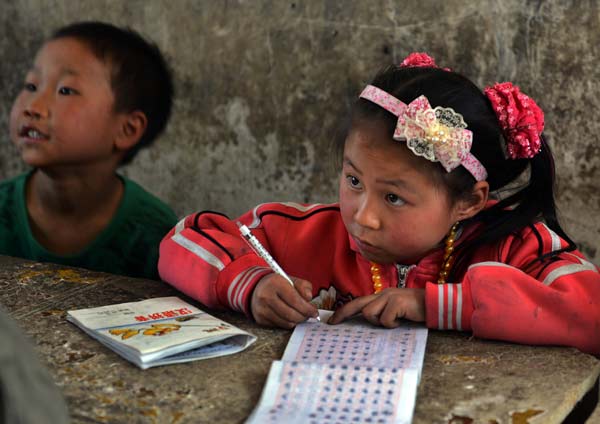Program promoting education for poor girls marks 30th anniversary
By Li Lei | China Daily | Updated: 2019-10-11 09:30

A Beijing-based foundation said on Thursday that it has taken new initiatives to promote young girls' access to education and psychological counseling. The moves marked the 30th anniversary of the foundation's flagship Spring Bud project, which helped put millions of poor girls in classrooms to combat gender bias.
In a media release, the China Children and Teenagers' Fund said it launched a flurry of new programs in early September as an extension of Spring Bud, whose public donations have topped 2.1 billion yuan ($294 million) over the last 30 years, helping eliminate rural traditions that prioritize boys in schools.
The latest projects range from lectures increasing rural girls' access to traditional Chinese culture to training sessions and vocational counseling aimed at promoting job opportunities. One project attempts to provide psychological comfort for so-called "left-behind" rural girls-whose parents are migrant workers-by pairing them with families in cities with whom they could pay mutual visits and keep daily contacts, it said.
While addressing a conference in Beijing marking Spring Bud's 30th birthday, the foundation's secretary-general Zhu Xisheng said the project, in addition to ensuring individual access to education and further development, has promoted gender quality and social stability in remote areas and helped eliminate the cycle of poverty there.
"Over time, the project has developed from ensuring school attendance to emphasizing the overall development of girls, including their moral integrity," he said.
In a report released at the ceremony, the secretary-general said that the program has helped 3.69 million financially strapped girls go to school, funded 1,811 rural schools and circulated millions of pamphlets helping young girls identify and evade sexual harassment. Almost 65 percent of the funds were spent in western regions.
"Behind the figures are countless altruistic individuals, businesses and other organizations," he said.
Launched in the late 1980s, Spring Bud started by focusing on boosting compulsory education attendance in rural areas where gender bias ran deep, and later expanded to include funding for rural schools and for poor female students in colleges or vocational schools.
In southwestern Guangxi Zhuang autonomous region, many of the project's beneficiaries over time have become the first female doctor, teacher or government employee in their hometowns.
Furthermore, China has seen a marked increase in women's literacy rate over the last few decades. According to a white paper released by the State Council Information Office last month, the illiteracy rate among girls and women aged 15 and older dropped from 90 percent when the People's Republic of China was founded in 1949 to 7.3 percent as of 2017.
The enrollment rate for girls in primary school reached 99.9 percent, a sign that gender bias in early education has been basically eliminated in China, it said.























